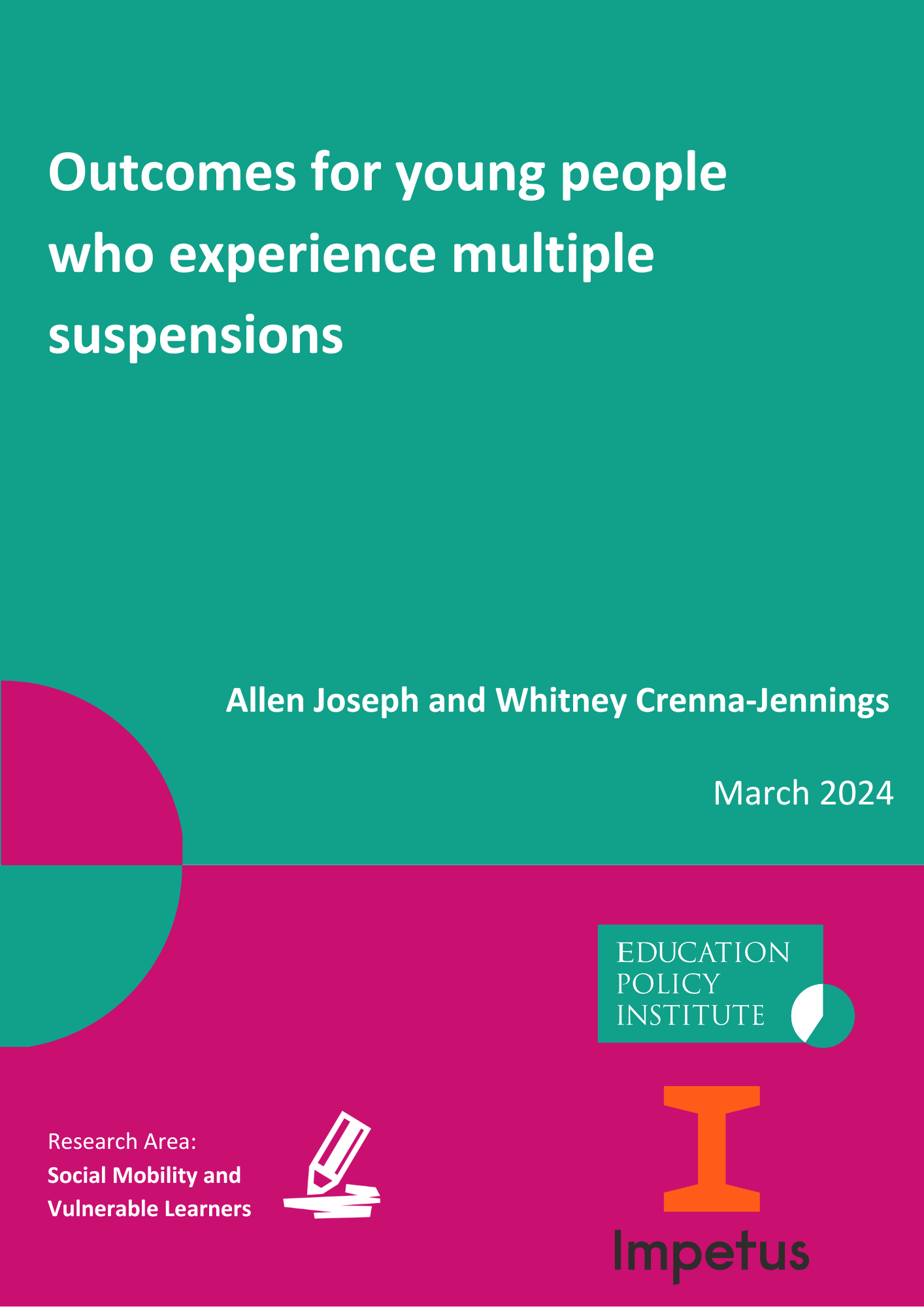In this report, we examine the relationship between the number of suspensions, or temporary removals from school, in secondary school and outcomes for pupils in England. We studied a cohort of 585,827 pupils who were registered in a state school in year 7 in 2014, following their time through secondary school until they sat their GCSE exams in 2019.
The research follows data showing that the rates of suspension from secondary school increased substantially in the years before the pandemic and reached their highest point in more than a decade in 2022. It also shows that pupils with social, emotional, or mental health needs were more likely to be suspended.
The report finds that:
- Pupils with even one suspension are, on average, not achieving a standard pass in GCSE English and maths
- Pupils with multiple suspensions have poorer education outcomes. Suspended pupils are, on average, approximately 12 months behind their not-suspended peers and are not achieving a standard pass in GCSE English and maths. This association persists after controlling for a wide range of student and school characteristics.
- The proportion of pupils identified with special education needs or disabilities (SEND) increases in line with the number of suspensions. Pupils suspended ten times were almost three times as likely to be identified with SEND as pupils who were suspended once. Of all SEND types, social, emotional, or mental health needs (SEMH) were the most common amongst suspended pupils.
- Multiple suspensions are a risk factor for permanent exclusion. Pupils suspended ten times were 15 times as likely to be permanently excluded compared to pupils who were suspended once.
- By the time they sit their GCSEs, pupils with multiple suspensions are less likely to be in a mainstream school and more likely to be in alternative provision (AP). Pupils suspended ten times or more were almost 15 times as likely to finish secondary school in alternative provision compared with pupils who were suspended once.
- Worryingly, separate survey evidence shows that many teachers do not feel equipped to support pupils with additional needs in their classroom.
The report recommends that:
- Schools should proactively identify those at risk of suspension and plan early intervention to reduce the need for suspension. This could include seeking and using all available information on children across school phases, including prior attainment in Year 6, SEND status including for those without an EHCP, attendance history, and previous disciplinary action.
- Schools and colleges must be equipped to recognise pupils with mental health and other additional needs. Given the link we found between social, emotional, mental health needs and suspensions, it is vital that schools have sufficient resources and teachers are equipped with the skills to recognise mental distress and be able to work closely with healthcare professionals, so pupils are referred on to appropriate services and receive effective support. This could be enabled by the Mental Health Support Teams which are currently being rolled out across the country.
- The Department for Education (DfE) should work with Ofsted to ensure that pupils who are suspended have access to high quality education. In 2023, the government published the SEND and AP improvement plan which would go some way toward addressing this; this plan included the rollout of a local and national inclusion dashboard, to inform decision-making and drive self-improvement across the system, as well as a bespoke AP performance framework. Implementation of the plan is ongoing, yet as of December 2023 a public version of the new inclusion dashboard had not yet been launched and the extent to which this will be delivered is unclear.
- More research is needed to understand the drivers behind the recent rise in suspension rates in secondary school. This research could inform more effective interventions that address the out-of-school drivers of suspensions and therefore reduce the need for suspension.
You can read the report here.

This report has been funded by Impetus. Website: https://www.impetus.org.uk/
About Impetus
Impetus transforms the lives of young people from disadvantaged backgrounds, by ensuring they get the right support to succeed in school, work and life. We find, fund and build the most promising charities working with these young people, providing core funding and working shoulder-to-shoulder with their leaders to help them become stronger organisations. In partnership with other funders we help our charities expand, and we work to influence policy and decision makers so that young people get the support they need.


